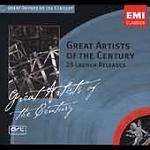This disc of classic recordings remains indispensable. Hans Hotter recorded the Bach Cantata No. 82 in 1950, and despite many wonderful recordings of the work since then, it retains both its power and primacy (especially if you prefer a lower voice in this piece). Hotter was only 31 at the time, and his voice was at its peak, warmly beautiful, with masterful legato and an even, dark tone whose every utterance bespeaks profundity. His tonal variety helps avoid the monotony that can result when a dark voice meets an even darker text. He infuses his voice with joy in the robust final aria in which death is embraced as an escape from life’s sorrows, and his legato singing is touchingly effective throughout, especially when sustained in his repetitions of the phrase “und zelig zu” in the aria “Schlummert ein”.
When he needs to, Hotter scales down his big voice to project a lighter-colored hue, and you’re often aware of subtle rubatos that deepen the meaning of the text without bending the vocal line out of shape as became fashionable in a later era. He gets good orchestral support from the band led by Geraint Jones, whose 1950s recordings of then-obscure Haydn symphonies deserve reissue.
Bleak is followed by bleaker–Brahms’ Four Serious Songs, from 1951. In the grim opening song, the music’s funereal sideways steps are broken by a stormy section in which we’re reminded that Hotter was the reigning Wotan of the past half-century. He brings an appropriately sepulchral tone to the second song, where at times the huge voice is scaled down to a whisper, an effect that’s sparingly used but (as done here) can make strong hearts melt. In the third song Hotter infuses his voice with bitterness, and in the last offers consoling comfort. A great performance. A dozen more Brahms songs complete the generously timed disc, many offering relief from the prevailing gloom. So Hotter puts a smile in his voice in “Sonntag”, tenderness in “Sappische Ode”, and bouncy joy and upper-register delicacy in “Städchen”. With the final “Verrat” he brings his incomparable dramatic power to the song’s gothic narrative of betrayal.
The sound is very good for its time. In the Bach, the orchestra presents a speaker-to-speaker sonic image, the voice naturally placed and the organ solidly delineated. In the Four Serious Songs both Hotter and pianist Gerald Moore are balanced well, but in the other Brahms songs, recorded in 1955, the piano is a bit backwardly placed and the singer closely miked so you hear occasional intakes of breath. [5/28/2004]
































